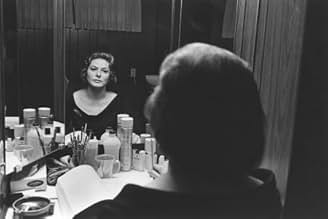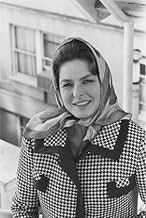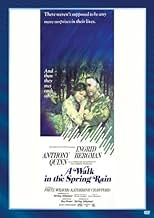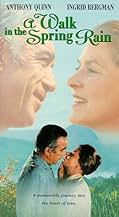IMDb रेटिंग
6.0/10
1 हज़ार
आपकी रेटिंग
अपनी भाषा में प्लॉट जोड़ेंThe Merediths move to an isolated farm. Mrs. Meredith and the neighbour Will Cade become friends and anticipate becoming lovers.The Merediths move to an isolated farm. Mrs. Meredith and the neighbour Will Cade become friends and anticipate becoming lovers.The Merediths move to an isolated farm. Mrs. Meredith and the neighbour Will Cade become friends and anticipate becoming lovers.
Tom Holland
- Boy
- (as Tom Fielding)
Michael Bullock
- One of men in fight crowd
- (बिना क्रेडिट के)
Janet Nelson Chadwick
- Singer at Festival (segment "Oh Shenandoah")
- (बिना क्रेडिट के)
फ़ीचर्ड समीक्षाएं
10MacNessa
How easy it is for the children to take their parents for granted? The key moment in the film is when the mother character(Ingrid Bergman) asks her daughter, if she has ever thought about her mother as a person. This is in response to her daughter's request that she leave her Smokey Mountains paradise(and new found love), so that she can take care of her grandchild while her daughter can be free to pursue her own law career. At the same time Anthony Quinn- Bergman's lover, is presented with a similar situation with his brutish son, who eyes the blossoming relationship with growing hostility. This is probably the main theme in this wonderfully shot and pleasantly paced drama. By todays standards the ending may be a little sad, but its far more realistic.
This is an excellent film which I caught accidentally on a rainy afternoon on cable. A professor and his wife head to the appalachians for his 1-year sabbatical. They rent a house from Will Cade (Anthony Quinn), an overly-friendly, hospitable country bumpkin. Will from the very beginning makes comments about how pretty the professor's wife is, and that's just the beginning. While the absent-minded professor is lost in his own world, concerned about his career and completing his book, Will Cade seems to just have too much time on his hands and spends it making the professor's wife more familiar with the wonders of Appalachia. He brings her flowers from the countryside, buys her animals to keep her company, takes her to see the beautiful scenery. None of these are overt passes, but they all could be interpreted either way, which is part of the genius of the film: on the one hand, Will Cade really is doing a lot of things for this woman and anyone would be touched by them; he is extremely sincere. But on the other, there is something about him which makes you uncomfortable, maybe his over-familiarity with people he doesn't know. In this way, it's similar to Cape Fear since it indirectly says a lot about social class--the professor is overly intellectual, but passionless and emotionally handicapped, unable to think of others besides himself; while the country bumpkin is not wordly, but very genuine and giving. There are two other subplots involved a daughter of the professor and his wife, and the Will Cade's son, with whom he has conflicts which are never fully explained. Eventually, the woman gives in and kisses Cade, and I won't give away the rest of the story. But the mood of the film is very well set. There is a great scene at an appalachian country fair where Will is in rare form and the professor is clearly uncomfortable in this "culture" which he doesn't consider a "culture". The whole story is set in this haunting, appalachian environment, which is how it is similar to "Deliverance". There is that fantasy which urban dwellers have of the simple, personal country life, and then there's the in-breeding, backwardness, and so-on they are repulsed by. I highly recommend this film.
Admirers of classic films will no doubt enjoy seeing Anthony Quinn reunited with Ingrid Bergman, his co-star from 1964's "The Visit"; they're an interesting screen match, but here, in 1970, with handyman Quinn talking in a southern drawl and matronly Bergman playing a professor's wife living on a farm in Tennessee, one cannot help but feel a sense of central dislocation. Bergman's husband (American actor Fritz Weaver) takes a year off from teaching to write a textbook, but instead stares at his typewriter, pipe firmly stuck between his teeth (his wife isn't frigid, but he is). It's no wonder then that Bergman enjoys Quinn's advances, but since they're both married--and have problems with their selfish children besides--it's hardly a December-age romance. Dreary melodrama, adapted from the book by Rachel Maddux, with clumsy exposition and even clumsier attempts to modernize an old formula. Charles Lang's cinematography is a visually jarring mix of location shots, back projection and ugly sets, while miscast Quinn is overly-friendly and solicitous (he makes the audience as uncomfortable as Ingrid's chilly spouse). While it's good to see the two stars together again, this Smoky Mountains scenario is a drag: colorlessly staged, poorly-conceived, predictable and depressing. ** from ****
A good-looking soap opera buoyed by veteran star power with a rather relentlessly melodious score by Elmer Bernstein and plush photography by Charles Lang; which when not taking in the vibrant Smoky Mountain local colour is concentrating upon the noble features of glamorous grannie, the eternally radiant Ingrid Bergman.
She's stuck with dry, pipe-smoking hubby Fritz Weaver (on sabbatical to write what sounds like a spectacularly dreary academic book), when fate sends her as her handyman sensitive hunk Anthony Quinn, who declares "You're full of love, ain't you Miss Roger?". What follows manages to be both melodramatic yet curiously passionless.
She's stuck with dry, pipe-smoking hubby Fritz Weaver (on sabbatical to write what sounds like a spectacularly dreary academic book), when fate sends her as her handyman sensitive hunk Anthony Quinn, who declares "You're full of love, ain't you Miss Roger?". What follows manages to be both melodramatic yet curiously passionless.
This is a bittersweet tale of two people from different worlds who fall in love and are unhappily married to others. Ingrid Bergman and Anthony Quinn make this story poignant, well-acted and believable.
It's love at first sight for Quinn as he comes out the box, swinging and pitching in his attraction for her. Honestly, it's just a little unsettling him always popping up, being a corn-pone chatterbox, subtly moving in with the compliments and lingering looks. He comes out the gate heated; but who can blame him. It's Ingrid Bergman he's fancying. And she slowly simmers as her attraction grows for the Tennessee mountain man Quinn plays. She's the wife of a University professor ( Fritz Weaver. ) Nice guy, good provider, but you know the type: he's no ogre, but he's staid, pedantic, and definitely not romantic. As she is throughout her career in films, Bergman is the one to watch. Her characters are so full of life if only allowed to break free.
You know how unfair, biased, skewed and stark movies present choices when they pit Marriage vs the Love Affair. We've seen it time and time again ( "The Arnelo Affair", "There's Always Tomorrow", etc. ) Well this movie is no different. Quinn's wife (played by Virginia Gregg ) is as drab and as sexless as Bergman is glamorous and sensual. It's difficult to conjure up why there was even an attraction between them ( Quinn & Gregg ) in the first place. Fritz Weaver's character fares no better. Apparently he doesn't realize what we all know very well from watching movies; when a spouse says: "let's go away, just the two of us" your marriage is on the rocks. Yet Weaver is clueless. Him throwing up their age as a deterrent to living more spontaneously is also a fly in the liniment.
The movie throws in an unnecessary monkey wrench with the issues of the son and daughter of Quinn's and Bergman's in order to create conflict. I do like how Bergman stands up to her daughter in order to try and get some piece of happiness and joy out of life instead of maternal duty. No, we didn't need the kids in this to get conflict. The story should have stayed focused on how Bergman and Quinn handle their situation.
It's love at first sight for Quinn as he comes out the box, swinging and pitching in his attraction for her. Honestly, it's just a little unsettling him always popping up, being a corn-pone chatterbox, subtly moving in with the compliments and lingering looks. He comes out the gate heated; but who can blame him. It's Ingrid Bergman he's fancying. And she slowly simmers as her attraction grows for the Tennessee mountain man Quinn plays. She's the wife of a University professor ( Fritz Weaver. ) Nice guy, good provider, but you know the type: he's no ogre, but he's staid, pedantic, and definitely not romantic. As she is throughout her career in films, Bergman is the one to watch. Her characters are so full of life if only allowed to break free.
You know how unfair, biased, skewed and stark movies present choices when they pit Marriage vs the Love Affair. We've seen it time and time again ( "The Arnelo Affair", "There's Always Tomorrow", etc. ) Well this movie is no different. Quinn's wife (played by Virginia Gregg ) is as drab and as sexless as Bergman is glamorous and sensual. It's difficult to conjure up why there was even an attraction between them ( Quinn & Gregg ) in the first place. Fritz Weaver's character fares no better. Apparently he doesn't realize what we all know very well from watching movies; when a spouse says: "let's go away, just the two of us" your marriage is on the rocks. Yet Weaver is clueless. Him throwing up their age as a deterrent to living more spontaneously is also a fly in the liniment.
The movie throws in an unnecessary monkey wrench with the issues of the son and daughter of Quinn's and Bergman's in order to create conflict. I do like how Bergman stands up to her daughter in order to try and get some piece of happiness and joy out of life instead of maternal duty. No, we didn't need the kids in this to get conflict. The story should have stayed focused on how Bergman and Quinn handle their situation.
क्या आपको पता है
- गूफ़The daughter's position at the kitchen table when Ingrid Bergman hits the cup and saucer with her hand.
- भाव
Libby Meredith: Oh, God, Will. You still believe in miracles. But, I don't. I almost did. Oh, I came so close.
- कनेक्शनFeatured in The Hollywood Collection: Anthony Quinn an Original (1990)
- साउंडट्रैकTitle song
("A Walk in the Spring Rain")
by Elmer Bernstein and Don Black
Title song sung by Michael Dees
टॉप पसंद
रेटिंग देने के लिए साइन-इन करें और वैयक्तिकृत सुझावों के लिए वॉचलिस्ट करें
- How long is A Walk in the Spring Rain?Alexa द्वारा संचालित
विवरण
- रिलीज़ की तारीख़
- कंट्री ऑफ़ ओरिजिन
- भाषा
- इस रूप में भी जाना जाता है
- Setnja po prolecnoj kisi
- फ़िल्माने की जगहें
- उत्पादन कंपनी
- IMDbPro पर और कंपनी क्रेडिट देखें
बॉक्स ऑफ़िस
- दुनिया भर में सकल
- $52
- चलने की अवधि1 घंटा 38 मिनट
- ध्वनि मिश्रण
- पक्ष अनुपात
- 2.35 : 1
इस पेज में योगदान दें
किसी बदलाव का सुझाव दें या अनुपलब्ध कॉन्टेंट जोड़ें

टॉप गैप
By what name was A Walk in the Spring Rain (1970) officially released in India in English?
जवाब



























